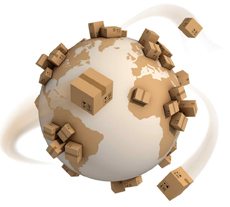 by Marc Zazeela
by Marc Zazeela
Marc Zazeela is a 20-year veteran of international mailing and shipping. He says, “My customers are my friends. They bring issues to me that challenge my imagination and my company’s capabilities. Together, we can discover a unique and creative approach to international logistics.” You can find him on Twitter at @MZazeela or on LinkedIn.
So, you have decided that you want to expand your business. Entering the international marketplace is the most logical, and easiest, way to do that. You don’t need to build additional infrastructure. You won’t need more personnel, and you don’t really have to worry (at first) about adding marketing resources. The simplest way to begin is to allow your international customers to purchase. Taking orders, accepting payments, and packing the international orders are not that different than it is for your domestic business, so why not give it a shot?
Shipping, on the other hand can present some challenges that can be easily mitigated or downright paralyzing, depending on how you prepare. It does not matter where in the world you are shipping; international customs is your only barrier to the final frontier! Clearing your shipments through customs can be a complex process. Get it wrong and your shipments could be held for long periods. It can consume lots of your time and give you, and your customers, lots of headaches. Taking some simple steps to head off the likely issues will make your life, and your customer’s experience, a whole lot more pleasant. Often times, what may seem like a simple matter, can spiral out of control before you realize what has happened. And, sometimes things can happen that don’t make any sense at all. For example:
 I sent two identical shipments of promotional brochures to two customers in different cities in Australia. I included identical paperwork for both of them. One shipment breezed through the clearance process while the other was held, pending more documentation, for weeks; all because of some wording in the original declaration paperwork. Something that seemed innocuous to us became an issue of great importance for the local customs office. Apparently the word “iPad” caused all of the problems. While the shipment contained nothing more than brochures about a course you could take on your iPad, customs flagged the shipment thinking we were shipping iPads. Had they opened the boxes, they would have seen nothing but paper, but that never happened, and there is no recourse.
I sent two identical shipments of promotional brochures to two customers in different cities in Australia. I included identical paperwork for both of them. One shipment breezed through the clearance process while the other was held, pending more documentation, for weeks; all because of some wording in the original declaration paperwork. Something that seemed innocuous to us became an issue of great importance for the local customs office. Apparently the word “iPad” caused all of the problems. While the shipment contained nothing more than brochures about a course you could take on your iPad, customs flagged the shipment thinking we were shipping iPads. Had they opened the boxes, they would have seen nothing but paper, but that never happened, and there is no recourse.
Lesson learned. When preparing your shipments for export, do your best to be aware of specific country restrictions and key words that may raise a red flag. International customs offices are getting much more technologically efficient at processing shipments and they rely more and more on computers to vet imported goods. Computers see things in black and white and don’t make subjective decisions. It either qualifies or it does not. When something gets rejected, it gets set aside for human review and that can take weeks. There are plenty of online resources available to help you decide if what you are shipping is going to be acceptable. Here are a couple of good ones:
http://pe.usps.com/text/imm/immctry.htm USPS list of countries and prohibited items.
http://www.cbp.gov/travel/international-visitors/kbyg/prohibited-restricted . US Customs and Border Patrol
Lastly, take care of your paperwork. Even though the items you are shipping may be permitted, how you describe them in your customs declaration can cause the customs computer to flag and reject your shipment. Beware of using words with chemical references, words having to do with animals, terms that might be considered weapons, and food related words. We have had cricket bats flagged because the computer thought we were shipping flying rodents! Following is a list of key words to consider avoiding.
If your goods are permitted and your paperwork is prepared properly, your shipments should clear customs without issue. Your customers will be happy and your business will flourish. International ecommerce is growing at a rate of 14% per year. Don’t be left out of the fun!
Happy shipping!
| CUSTOMS HIGH RISK WORDS | ||
| Alcohol | Fish | Plutonium |
| Ammo | Flail | Port |
| Ammunition | Flare | Precious stone |
| Analgesic | Food | Prescription medicine |
| Animal | Fossil | Pyrotechnic device |
| Armour | Fur | Refrigerant |
| Asbestos | Fuse | Rifle |
| Axe | Gas | Rocket |
| Bacteria | Gem | Rum |
| Baton | Glazed | Scotch |
| Beer | Gold | Seed |
| Biological | Grappa | Shell |
| Blade | Grenade | Shellcase |
| Blowpipe | Gun | Silencer |
| Bomb | Handgun | Silver |
| Bourbon | Herb | Skin |
| Brake | Hormone | Slingshot |
| Brandy | Household effects | Snuff |
| Bullet | Household goods | Sodium |
| Cannon | Hydrogen | Spirit |
| Caps | Insect | Stungun |
| Capsule | Ivory | Sulphur |
| Car | Jewel | Supplement |
| Carnet | Knife | Tablet |
| Cartridge | Knives | Tabs |
| Caviar | Knuckleduster | Taser |
| Cement | Lighter | Throwing star |
| Chemical | Lithium | Tobacco |
| Chewing tobacco | Magnesium | Toothfish |
| Cigar | Marine | Torpedo |
| Cigarette | Medicine | Toxin |
| Clam | Metal | Traditional medicine |
| Collar | Micro organism | Truck |
| Coral | Military | Uranium |
| Crossbow | Mine | Van |
| Dagger | Missile | Vegetation |
| Dart | Motor bike | Vehicle |
| Diamond | Nuclear | Vitamin |
| Dog Collar | Nunchakus | Vodka |
| Drink | Pelt | Waste |
| Drug | Personal effects | Weapon |
| Explosive | Pharmaceutical | Whisky |
| Fire | Pill | Wine |
| Firearm | Pistol | Wood |
| Fireworks | Plant | Zinc |












One Response
These are great tips thank you for publishing this. Importing and Exporting products to international market helps the global market stock into widely range of business organization exchanging goods and products around globe.